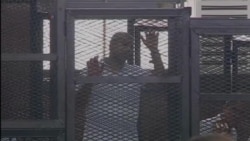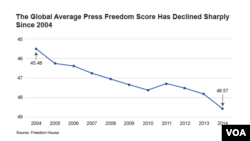ເສລີພາບຂອງວົງການຂ່າວໃນໂລກ ໄດ້ຫລຸດລົງໃນປີແລ້ວນີ້ ສູ່
ລະດັບຕໍ່າສຸດ ໃນຮອບດົນກວ່າໜຶ່ງທົດສະວັດ ອີງຕາມລາຍງານ
ສະບັບໜຶ່ງທີ່ອອກອອກເຜີຍແຜ່ເມື່ອທ້າຍເດືອນເມສາຜ່ານມາ
ໂດຍອົງການຕິດຕາມເບິ່ງສະພາບການດ້ານສິດທິມະນຸດນາໆຊາດ
Freedom House. ນັກຂ່າວວີໂອເອ William Gallo ມີລາຍລະ
ອຽດ ດັ່ງສິງຈະນຳມາສະເໜີທ່ານ.
ລາຍງານການສຳຫລວດປະຈຳປີຂອງອົງການ Freedom House ກ່າວວ່າ ບັນດານັກຂ່າວໃນທົ່ວໂລກ ປະເຊີນກັບຂໍ້ຈຳກັດຮັດແຄບນາໆປະການ ທີ່ວາງຕໍ່ເຂົາເຈົ້າໂດຍກຳລັງ
ຕ່າງໆ ຮວມທັງພວກລັດຖະບານຜະເດັດການ ພວກກໍ່ການຮ້າຍ ແລະເຈົ້າຂອງສື່ມວນຊົນທີ່ຫວັງຜົນປະໂຫຍດ ດ້ານທຸລະກິດ.
ພວກທີ່ກະທຳຜິດຮ້າຍແຮງທີ່ສຸດໃນບັນຊີຂອງອົງການ Freedom House ທີ່ຈັດລະດັບ
199 ປະເທດຫຼືດິນແດນ ກໍແມ່ນເກົາຫຼີເໜືອ Uzbekistan, Turmenistan, Belarus, ຄິວບາ ຊີເຣຍ ອີຣ່ານ ແລະໄຄຣເມຍ. ນໍເວ ສະວີເດັນ ແລະ Belgium ແມ່ນຢູ່ໃນອັນດັບ
ທີ່ສູງສຸດຢູ່ໃນບັນຊີ.
ອົງການ Freedom House ກ່າວວ່າ ເວົ້າລວມແລ້ວ ມີພຽງແຕ່ 14 ເປີເຊັນເທົ່ານັ້ນຂອງປະຊາກອນໂລກ ທີ່ອາໄສຢູ່ໃນພວກປະເທດທີ່ເສລີ “ບ່ອນທີ່ມີການລາຍງານຂ່າວດ້ານການເມືອງທີ່ແຂງແຮງ ຄວາມປອດໄພຂອງນັກຂ່າວໄດ້ຮັບການຄ້ຳປະກັນ ການແຊກແຊງຂອງລັດເຂົ້າໃນກິດຈະການສື່ມວນຊົນມີໜ້ອຍ ແລະວົງການຂ່າວບໍ່ຕົກຢູ່ພາຍໃຕ້ຄວາມກົດດັນທາງດ້ານກົດໝາຍ ຫຼືເສດຖະກິດທີ່ໜັກໜ່ວງ.”
ລາຍງານສະບັບນີ້ ໃຫ້ເຫດຜົນ ກ່ຽວກັບການຕົກຕ່ຳລົງໃນເສລີພາບຂອງວົງການຂ່າວ ວ່າເປັນຍ້ອນການເພີ້ມທະວີຂຶ້ນຂອງກົດໝາຍທີ່ ຈຳກັດຮັດແຄບຕໍ່ວົງການຂ່າວ ແລະວ່າ ມີຢູ່ເລື້ອຍໆທີ່ພວກກົດໝາຍເຫຼົ່ານີ້ ໄດ້ຖືກຮັບຜ່ານເອົາຢ່າງໂຈ່ງແຈ້ງ ຍ້ອນເຫດຜົນທາງດ້ານຄວາມປອດໄພແຫ່ງຊາດ.
ອີກເຫດຜົນໜຶ່ງທີ່ຖືກອ້າງວ່າ ເປັນສາເຫດຂອງການຊຸດໂຊມລົງຂອງເສລີພາບສື່ມວນຊົນ ກໍຄືຄວາມບໍ່ສາມາດຂອງພວກນັກຂ່າວທ້ອງຖິ່ນ ແລະນັກຂ່າວຕ່າງປະເທດ ໃນການເຂົ້າຫາແລະໄປລາຍງານຂ່າວຢ່າງເສລີໄດ້ ໃນຫຼາຍໆເຂດ ເຊັ່ນຢູ່ບອ່ນທີ່ມີການປະທ້ວງ ແລະໃນເຂດສົງຄາມນັ້ນ.
ລາຍງານສະບັບນີ້ ເວົ້າໃນທາງລົບເປັນສ່ວນໃຫຍ່ ກ່ຽວກັບເຫດການ ຕ່າງໆທີ່ເກີດຂຶ້ນໃນ
ພາກຕາເວັນອອກາງ ແລະໃນອາຟຣິກາເໜືອ ບ່ອນທີ່ຄື້ນຟອງແຫ່ງການປະທ້ວງ ທີ່ເອີ້ນວ່າ
ລະດູບານໃໝ່ອາຫຣັບ ຫຼື Arab Spring ບໍ່ໄດ້ຍັງຜົນຫຍັງໃຫ້ເກີດຄວາມກ້າວໜ້າຫລາຍ
ປານໃດ ໃນຮູບຂອງການມີເສລີພາບເພີ້ມຂຶ້ນນັ້ນ.
ອົງການ Freedom House ເວົ້າວ່າ “ຫຼັງຈາກໄດ້ຮັບຄວາມກ້າວໜ້າຄັ້ງປະຫວັດສາດ
ໃນພາກຕາເວັນອອກກາງໃນປີ 2011 ນັ້ນແລ້ວ ກໍມີພຽງປະເທດດຽວເທົ່ານັ້ນ ທີ່ສືບຕໍ່ທຳຄວາມຄືບໜ້າໄປສູ່ການບັນລຸຄຳ ໝັ້ນສັນຍາຂອງ Arab Spring. ປະເທດນັ້ນກໍຄື Tunisia ທີ່ໄດ້ທຳຄວາມກ້າວໜ້າຫລາຍກ່ວາປະເທດອາຫຣັບອື່ນໃດ ໃນໄລຍະໜຶ່ງທົດສະວັດປາຍຜ່ານມາ ແຕ່ລາຍງານກ່າວວ່າ ເຖິງຢ່າງໃດ Tunisia ກໍ ຍັງເສລີເປັນບາງສ່ວນເທົ່ານັ້ນ.”
ມີພຽງແຕ່ 2 ເປີເຊັນເທົ່ານັ້ນຂອງປະຊາຊົນຢູ່ໃນພາກຕາເວັນອອກກາງ ແລະອາຟຣິກາເໜືອ ທີ່ອາໄສຢູ່ໃນສະພາບແວດລ້ອມຂອງວົງການຂ່າວທີ່ເສລີ ອີງຕາມການປະເມິນຂອງອົງການ Freedom House.
ລາຍງານໄດ້ເນັ້ນໂດຍສະເພາະ ໃສ່ການຕົກຕ່ຳລົງ ໃນປະເທດອີຈິບ ລີເບຍ ຊີເຣຍ ແລະ ອີຣັກ ຊຶ່ງເປັນພວກປະເທດທີ່ໄດ້ເຫັນການເຄື່ອນໄຫວຂອງພວກຫົວຮຸນແຮງເພີ້ມທະວີຂຶ້ນ ໃນຮອບປີທີ່ຜ່ານມາ.
ຢູໃນທະວີບອາເມຣິກາ ລາຍງານໃຫ້ຂໍ້ສັງເກດເຖິງການຖອຍຫລັງຄືນໃນເສລີພາບ ຢູ່ໃນປະເທດ Honduras, Peru, Venezuela, Mexico ແລະ Ecuador. ຄິວບາກໍໄດ້ຖືກຈັດຢູ່ໃນລະດັບຕ່ຳເຊັ່ນກັນ ເຖິງແມ່ນສະຫະລັດໄດ້ເຄື່ອນໄຫວ ເພື່ອເປີດສາຍພົວພັນທາງການທູດຄືນ ກັບປະເທດຄອມມິວນິດແຫ່ງນີ້ ກໍຕາມ.
ລາຍງານໃຫ້ຂໍ້ສັງເກດຕື່ມວ່າ ເຖິງແມ່ນໄດ້ມີການປ່ອຍໂຕພວກນັກໂທດການເມືອງ ກວ່າ 50 ຄົນ ໃນທ້າຍເດືອນທັນວາ ປີຜ່ານມານີ້ ກໍຕາມ ແຕ່ກໍຍັງມີນັກຂ່າວຫຼາຍຄົນ ຖືກຂັງຄຸກຢູ່ໃນລະຫວ່າງປີ 2014 ນັ້ນ ແລະການກວດກາຂ່າວຂອງທາງການກໍຍັງມີຢ່າງແຜ່ຫຼາຍ ເຮັດໃຫ້ຄິວບາເປັນປະເທດ ທີ່ມີເສລີພາບດ້ານການຂ່າວໜ້ອຍທີ່ສຸດໃນຂົງເຂດ ດ້ວຍຄະ
ແນນ ພຽງ 91.
ຢູ່ເອເຊຍນັ້ນ ກໍມີເກົາຫຼີເໜືອ ທີ່ເປັນປະເທດທີ່ຈຳກັດຮັດແຄບເສລີພາບດ້ານການຂ່າວຫລາຍທີ່ສຸດຂອງໂລກ ແລະ ສປປ ລາວ ຫວຽດນາມ ກັບ ຈີນ ຊຶ່ງເປັນພວກປະເທດທີ່ກວດກາແລະຄວບຄຸມວົງການຂ່າວແຕ່ປະວັດສາດມາແລ້ວ.
ທ່ານນາງ Vanessa Tucker ເປັນຮອງປະທານຝ່າບວິເຄາະຂ່າວ ຂອງອົງການ Freedom House.
ທ່ານນາງ Tucker ກ່າວວ່າ “ໜຶ່ງໃນຫຼາຍໆດ້ານທີ່ພວກເຮົາສັງເກດເຫັນ ທີ່ວ່າເປັນບັນຫາຢ່າງແທ້ຈິງ ໃນລະດັບໂລກແລະລະດັບຂົງເຂດ ໃນເວລານີ້ ກໍຄືຜົນກະທົບ
ຈາກພວກປະເທດເຊັ່ນຈີນ ຕໍ່ເພື່ອນບ້ານ. ດັ່ງນັ້ນ ແນ່ນອນ ພວກເຮົາຈຶ່ງໄດ້ເຫັນວ່າ ຜົນສະທ້ອນໃນທາງລົບ ຈາກພຶດຕິກຳຕ່າງໆຂອງຈີນ ຢູ່ໃນຮົງກົງ ໃນໄຕ້ຫວັນ ແລະ
ປະເທດເພື່ອນບ້ານອື່ນໆອີກ ຈຳນວນໜຶ່ງ.”
ມຽນມາກໍໄດ້ປະສົບກັບການຕ່າວປີ້ນຂອງເສລີພາບໃນວົງການຂ່າວ ໃນປີ 2014 ນັ້ນ ລຸນຫຼັງໄດ້ມີການປັບປຸງໃຫ້ດີຂຶ້ນມາໄດ້ຫຼາຍປີ ຫຼັງຈາກການຍຸດຕິລົງຂອງການປົກຄອງໂດຍກົງ
ຂອງທະຫານ ໃນປີ 2011.
ທ່ານນາງ Sarah Cook ເປັນນັກວິເຄາະອາວຸໂສຝ່າຍຄົ້ນຄວ້າກ່ຽວກັບເອເຊຍຕາເວັນອອກ ຂອງ Freedom House.
ທ່ານນາງ Sarah Cook ກ່າວວ່າ “ປີນີ້ ພວກເຮົາໄດ້ເຫັນນັກຂ່າວ ຈຳນວນໜຶ່ງ
ທີ່ບໍ່ພຽງແຕ່ໄດ້ຖືກຈັບກຸມ ຫຼືກັກຕົວເທົ່ານັ້ນ ແຕ່ໄດ້ຖືກລົງໂທດຈຳຄຸກນຳ. ພວກ
ນັກຂ່າວຕ່າງປະເທດບາງຄົນ ກໍປະເຊີນກັບ ຂໍ້ຈຳກັດຮັດແຄບດ້ານວີຊາ ທີ່ເຂັ້ມ
ງວດຂຶ້ນ.”
Freedom House ກ່າວວ່າ ເຂດ Eurasia ຍັງເປັນເຂດທີ່ຂີ້ຮ້າຍ ທີ່ສຸດຂອງໂລກ ສຳລັບເສລີພາບໃນວົງການຂ່າວ ໂດຍໃຫ້ຂໍ້ສັງເກດໂດຍສະເພາະ ເຖິງການຕົກຕ່ຳລົງຢູ່ຣັດເຊຍ.
ສ່ວນຢູໂຣບນັ້ນ ກໍຍັງເປັນພາກພື້ນທີ່ໄດ້ຮັບຄະແນນສູງທີ່ສຸດຈາກ Freedom House ແຕ່ເຖິງຢ່າງໃດ ຂົງເຂດດັ່ງກ່າວກໍໄດ້ປະເຊີນກັບການຕົກຕ່ຳລົງຫຼາຍທີ່ສຸດ ອັນດັບສອງຂອງຕົນ ໃນຮອບທົດສະວັດທີ່ຜ່ານມາ.
A new report says worldwide working conditions for the news media have fallen sharply to their lowest point in more than 10 years. The study says journalists are facing more restrictions from governments, militants, criminals and owners of the media.
While the spread of smartphones and the internet means news is easier than ever to access, journalists are finding themselves in courtrooms, behind bars, intimidated, even silenced, according to a report by the independent watchdog organization, Freedom House.
ຢ່າລືບ graph ນີ້
“Unfortunately, the news is very bad. Press freedom suffered a global decline in 2014. It is the worst decline in a decade. Things are getting bad and they are getting bad even faster than they have in the past,” said Vice President for Analysis Vanessa Tucker.
The worst offenders on the organization's ranking of 199 nations or territories were North Korea, Uzbekistan, Turkmenistan, Belarus, Cuba, Syria, Iran and Crimea. Norway, Sweden and Belgium topped the list.
Overall, Freedom House says just 14 percent of the world's population lives in free countries "where coverage of political news is robust, the safety of journalists is guaranteed, state intrusion in media affairs is minimal, and the press is not subject to onerous legal or economic pressures."
The report attributed the decline in press freedom to an increase in restrictive laws against the press. It said these laws were often passed ostensibly for national security reasons.
Another reason cited for the deterioration of media liberties was the inability of local and foreign journalists to physically access and report freely in areas such as protest sites and war zones.
Americas
While much of North America was rated as having a free press, much of Latin America was either partially free or not free.
According to Freedom of the Press 2015, Mexico intimidated journalists and passed a controversial communications law.
The report also noted rollbacks in freedom in Honduras, Peru, Venezuela, and Ecuador. Press freedom was also ranked poorly in Cuba, despite the U.S. move to re-open diplomatic relations with the Communist country.
"[Despite] the resulting release of over 50 political prisoners in late December, journalists were still behind bars during 2014, and official censorship remained pervasive, leaving Cuba as the worst performer in the region with a score of 91," it noted.
The United States was criticized for the rough treatment of journalists by police during protests in Ferguson, Missouri.
The report also said "press freedom advocates remained concerned about certain practices and policies of the federal government, including the Obama administration’s relatively rigid controls on the information coming out of the White House and government agencies."
Asia-Pacific
In the Asia-Pacific region only five percent of the population had access to free media, while the rest were split evenly between partly free or not free.
China’s scored its lowest since the 1990s, as authorities jailed journalists and tightened control over media outlets.
“One of the areas that we noted that is a real problem globally and regionally right now is the impact of actors like China on their neighbors. So we saw that actions that China took had a negative impact, of course, in Hong Kong, in Taiwan and some of the other neighboring countries,” said Tucker.
Asia also includes the world's worst-rated country, North Korea, as well as historically poor performers Laos and Vietnam.
Myanmar, also known as Burma, experienced a reversal in press freedoms in 2014, a trend that follows several years of improvement following the end of direct military rule in 2011.
"This year we saw a number of journalists who were not only arrested or detained but also received prison terms. Some foreign journalists also encountered harsher visa restrictions," said Sarah Cook, a senior East Asia research analyst for Freedom House.
Middle East and North Africa
The report was largely negative about developments in the Middle East and North Africa, where a wave of street protests, referred to as the Arab Spring, has produced little results in the way of increased freedom.
"After historic gains in the Middle East in 2011, only one country has continued to make progress toward fulfilling the promise of the Arab Spring. Tunisia registered the best score of any Arab country in over a decade, although it remained Partly Free," the report said.
Only two percent of those living in the Middle East and North Africa have a free press environment, Freedom House estimates. It particularly highlighted declines in Egypt, Libya, Syria, and Iraq - countries that have seen increased militant activity in the past year.
Sub-Saharan Africa
In sub-Saharan Africa only three percent of the population is exposed to information from free media.
More than half of the press is partly free and nearly 40 percent are not free.
Sub-Saharan Africa was the only region to show improvement in press freedom in 2014, although the report said "most countries that earned improvements started from a low baseline, such as Central African Republic and Guinea-Bissau."
Eurasia
The Freedom House report says the Eurasia region’s average score remained the worst in the world.
More than 80 percent of the media was judged as not free and less than 20 percent partly free.
In Russia, the report says, there was a crackdown on independent voices inside the country and in neighboring nations.
“One of the big areas of troubling impact that we saw was in propaganda. So completely fabricated propaganda such that people inside of Russia have essentially no idea what is going on in conflicts like that in Ukraine,” said Tucker.
Europe
Europe was the group's highest-ranking region, although it noted that the region experienced the second-largest decline over the past decade.
Freedom House says the growing threats to the media are a stark challenge to democratic values around the globe.
VOA correspondent Meredith Buel contributed to this report.






